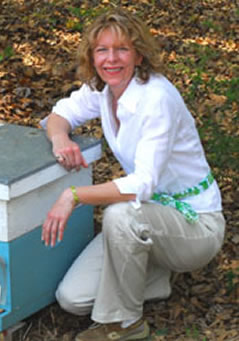NORTH SOMERSET BEEKEEPERS
Jennifer placed the temperament of the Queen as the most important aspect of choosing breeding stock, something that I think most of us would agree with. She also emphasised the importance of developing good drone lines as well as good queen lines in our breeding programmes. She advocated inserting a frame of drone foundation into each good colony to ensure a plentiful supply of drones from these colonies. I think that many of us just assume that "there will be drones up there" rather than actively producing good drones.
One of the attendees at the meeting was Julia Common from the University of Vancouver, who had delivered one of our previous talks. I found it fascinating that we, as a small bunch of beekeepers in the UK, were able to facilitate a live discussion between a beekeeper who had kept bees in a Georgia jail, and a beekeeper who had kept bees in an inner-city area of Vancouver! A recording of the talk can be viewed using the passcode rh!LR76f at: https://us02web.zoom.us/rec/share/dNelTNfRk17oSDL9zx9B4xqUc8JXx-yL3ZdtiwFAxtokSnlmiGii_Z7NxkM7Cc0C.xclt4at8LrgqzF7J David Capon 7/1/20
0 Comments
Leave a Reply. |
